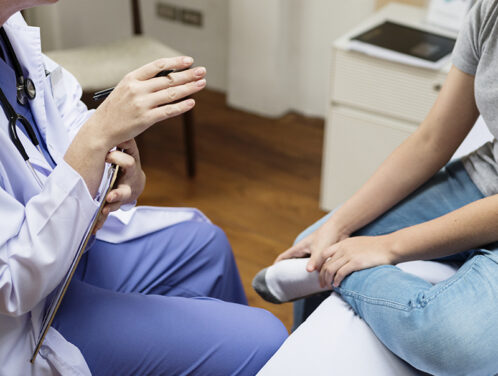Maintaining a healthy vulva and vagina can prevent infections and eliminate irritation and discomfort that can drive women batty. Besides, no one wants to be itchy or irritated down there in need of vaginal health testing. You may not have given much thought to maintaining a healthy vulva and vagina, after all, the organ is self-cleaning, but there are health and lifestyle steps you can take to prevent infection and discomfort.
Here are ten tips to level up your vaginal care.
1. Be careful what you wash with.
Since the vagina cleanses itself naturally by normal vaginal discharge, washing with warm water is all that’s needed. If you do use soap, pick one that is gentle and unscented to prevent irritating sensitive tissue with harsh cleansers. And skip douching. Research shows douching is unnecessary and is linked to infections, STIs, and problems getting pregnant.
2. Choose the right underwear.
White, 100 percent cotton panties are the best option. Avoid man-made fabrics like nylon and acetate and skip thongs as they can irritate the vulva.
3. Wash undergarments separately for good vaginal care.
Wash undergarments separately from other laundry, use a gentle detergent and choose a double rinse cycle if possible. Do not use too much laundry detergent as it can be an irritant if not rinsed thoroughly.
4. Buy soft, unscented toilet paper.
Select white, unscented soft toilet paper so you don’t irritate the sensitive skin of the vulva with rough paper or chemicals from scents.
5. Use unscented tampons.
Choose unscented tampons for menstrual bleeding rather than sanitary pads since the fabric is less irritating and doesn’t chafe. However, don’t leave tampons in overnight or for long periods due to toxic shock syndrome, a life-threatening condition where high absorbency tampons may cause certain bacteria to multiply. Change tampons every four hours or more frequently during heavy bleeding.
6. Boost your immunity.
Research suggests that infections like bacterial vaginosis (BV), which you need vaginal health testing for, may be linked to a decreased immune system. The microbiome (the balance of good and bad bacteria) in the vagina can be affected by diet and exercise. So, practice healthy living, and eat a nutritious diet including probiotic-rich foods that can help balance the body’s bacteria such as yogurt, kefir, tempeh, kimchi, and sauerkraut. Also, consider taking a probiotic supplement, especially if you’re prone to vaginal infections. What’s more, having a healthy sex life can also boost immunity.
7. Balance your vaginal microbiome.
The vaginal microbiome consists of more than 50 types of microbes that keep the vagina healthy. Keep it that way by not douching, wearing tight-fitting clothing, or having unprotected sex. Mild irritation may mean your vaginal pH is out of whack. You can try to restore it by eating probiotic-rich foods or taking probiotic or garlic supplements. If you suspect an infection, see your doctor for vaginal health testing.
8. Practice good sexual hygiene.
Keep your vagina healthy after sex by practicing a few good sexual hygiene habits: Pee after intercourse to reduce the risk of urinary tract infections (UTIs). Rinse off or take a shower after sex to keep bacteria from entering the vagina. Wash sex toys after each use. And use lubricant if you experience vaginal dryness.
9. Watch your stress levels for better vaginal care.
If you thought stress just caused strokes and heart attacks, think again. It’s bad for your vagina, too. A study found chronic stress can interrupt the vaginal microbiome and leave you vulnerable to infections. So, take stress seriously and decompress with deep breathing, yoga, journaling, meditating, regular exercise, and the things you love to do that keep you sane and stress-free.
10. Inspect your vagina.
It’s hard to assess if something is wrong when you don’t know what you’re looking for so become familiar down there. Frequently inspect using a hand mirror and note the color, consistency of discharge throughout the month, and any odor or signs of redness, irritation, lumps, or bumps. If anything is off, call your doctor to schedule vaginal health testing.






